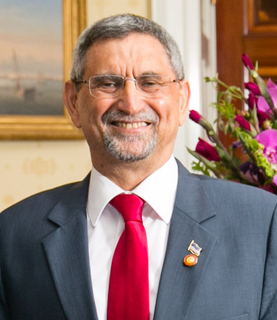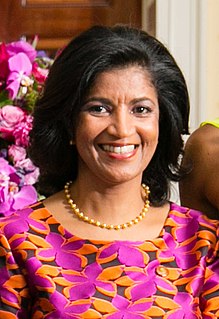
Politics of Cape Verde takes place in a framework of a semi-presidential representative democratic republic, whereby the Prime Minister of Cape Verde is the head of government and the President of the Republic of Cape Verde is the head of state, and of a multi-party system. Executive power is exercised by the President and the Government. Legislative power is vested in both the Government and the National Assembly. The Judiciary is independent of the executive and the legislature. The constitution first approved in 1980 and substantially revised in 1992 forms the basis of government organization. It declares that the government is the "organ that defines, leads, and executes the general internal and external policy of the country" and is responsible to the National Assembly.

Aristides Maria Pereira was a Cape Verdean politician. He was the first President of Cape Verde, serving from 1975 to 1991.

Pedro de Verona Rodrigues Pires was the President of Cape Verde from March 2001 to September 2011. Before becoming President, he was Prime Minister from 1975 to 1991.

José Maria Pereira Neves is a Cape Verdean politician who was Prime Minister of Cape Verde from 2001 to 2016. He is a member of the African Party for the Independence of Cape Verde (PAICV).

António Manuel Mascarenhas Gomes Monteiro was the first democratically elected President of Cape Verde from 22 March 1991 to 22 March 2001.
Carlos Alberto Wahnon de Carvalho Veiga is a Cape Verdean politician. He was Prime Minister of Cape Verde from April 4, 1991 to July 29, 2000.
The Democratic and Independent Cape Verdean Union is a conservative political party in Cape Verde.

The unicameral National Assembly is the legislative body of the Republic of Cape Verde.

Parliamentary elections were held in Cape Verde on 22 January 2006. The result was a victory for the ruling African Party for the Independence of Cape Verde (PAICV) run by José Maria Neves, which won 41 of the 72 seats in the National Assembly. Second was the Movement for Democracy (Mpd) and third was Democratic and Independent Cape Verdean Union (UCID) led by João Santos dos Luís.

Presidential elections were held in Cape Verde on 12 February 2006, the fourth presidential elections since the introduction of multi-party politics in 1990.

Presidential elections were held in Cape Verde on 11 February 2001, with a second round on 25 February after no candidate achieved outright victory in the first round. The result was a victory for Pedro Pires of the African Party for the Independence of Cape Verde, who defeated Carlos Veiga of the Movement for Democracy by just twelve votes. Pires, a former Prime Minister, took office on 22 March 2001, replacing António Mascarenhas Monteiro, who stood down after completing two terms in office.

Presidential elections were held in Cape Verde on 2 October 2016. Incumbent President Jorge Carlos Fonseca of the Movement for Democracy (MpD) was re-elected with 74.08% of the vote.
Janira Isabel Fonseca Hopffer Almada is a politician from Cape Verde who was the leader of the African Party for the Independence of Cape Verde (PAICV) from 2014–2016.

Lígia Arcângela Lubrino Dias Fonseca is a Cape Verdean lawyer, activist, and politician who has served as the First Lady of Cape Verde since 2011. Fonseca became the first female president of the Cape Verdean Lawyers' Association (OAC), the country's national bar association, in 2001. She is married to Cape Verdean President Jorge Carlos Fonseca.

Liceu Domingos Ramos is a public secondary school in the northern part of the city centre (Plateau) of Praia, Cape Verde. As of 2015, it has 2,300 students, 63 classes and 110 teachers. It was established as Liceu Adriano Moreira in 1960. In 1975, at the independence of Cape Verde, it was renamed Liceu Domingos Ramos.















